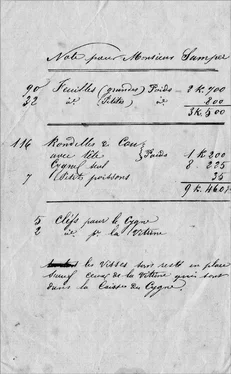In Karlsruhe I took rooms at the Gasthaus an der Kaiser Straße knowing I would need some time to practise my grammar. Also, having left Low Hall in an awful rush, I needed time to still my injured heart, to sit myself down and understand the situation I had arrived in.
To that end I bought a child’s exercise book from the printer Herr Froehlich who must have been, by my brother’s calculation, a peasant—that is, he had no English. It was my intention that I should make an “adventure” of my sad situation and that Percy should feel himself a constant partner. I would keep a day journal to serve as raw material for a continual stream of letters that would place me always by his side.
ONE CANNOT CLAIM THAT sanity has been, so to speak, one’s birthright . There were several aunts who proved a little wobbly and my uncle Edward, an exceptional athlete, returned to his bed for thirty years after rescuing a young boy from the German Sea at Aldeburgh. If we Brandlings have sometimes lost our wits or our fortunes on the horses we have also—this is the other side of the coin—known that the impossible was possible nine times out of ten. That was the basis of our fortune. If the pater had not believed that the steam engine was possible he would not have plunged so much on Stephenson. He therefore ruined himself, or so it was said for a number of years. But of course the impossible was possible and because of that there was now a Brandling Railway and a Brandling Junction, and as a result of that triumph he could order the draughtsman to conjure up that extraordinary spectacle, of the swift trains rolling sweetly through the glass tunnels in the middle of Fortnum & Mason’s.
In this sense I was, if only in a modest sense, a Brandling.
Of course no one in Karlsruhe knew what a Brandling was or how he should be treated. Certainly no English soldier would dream of ordering me to vacate a park bench so he might occupy it, and when a German did so, my dictionary was no use at all. Likewise the town’s clockmakers did not seem to know how they should treat me. After some four or five unsatisfactory encounters I was cheered enormously to spy, through green panes of ancient glass, a very clever music box made in the form of a merry-go-round. The horses were moving up and down and the riders themselves responding in the most original and lifelike manner, raising an arm high, or slipping sideways in a saddle. Entering a door so low I had to stoop, I beheld the watchmaker himself scuttling out of the shadows of his workroom still buttoning his frock coat. In the light he revealed himself to be slight and very fair, with those pale watery eyes so common in those who spend their days peering into complex engines. He was not a young man and suggested, by his general manner, someone who had found the life of solitude he sought.
At first everything seemed very promising, and he examined my plans with interest. Would he accept them? His feelings were not clear. Yet he was a watchmaker with an ingenious automaton in his window. I had brought him a project worthy of his peculiar intelligence.
“You wait,” he said in English. I thought, thank God, but he spoke no more, using mime to indicate that he would leave the shop, but not for long. Far from being offended when he locked the door behind him, I was encouraged.
While I waited I contented myself with the queer facsimile of life, so dead and not dead it would give a man goose-bumps. All its details I would remember for my son. There were perhaps twenty riders and each one must have, at the heart of its magic, a series of brass cams of the most ingenious construction. It is no small thing to be able to turn these curiously shaped parts, but that is not the half of it for the watchmaker must be an artist who can observe the natural movement of the human figure, and then know what cams he must cut to achieve his counterfeit.
So there I was, the Second Friend—all knees and moustache, happily crouched beside the door, observing the wonderful machine like a tail-flicking cat—when my man returned. Behind him was a very homely-looking fellow, a policeman in fact.
He had been conscripted to translate, and began his service by telling me I was a Respected Sir, and as Karlsruhe seemed to be a place where one must be a Respected Sir, I was very pleased to hear him say so.
I told the policeman that M. Vaucanson’s original no longer existed. His countryman Goethe had seen it, did he know of Goethe?
“But of course Sir, we are Germans.”
“Yes,” I said. “Then you will understand Goethe saw the duck after Vaucanson’s death. He said it was in the most deplorable condition. The duck was like a skeleton and had digestive problems.”
I thought, they have never heard of Vaucanson.
The policeman told me, “I will take you.”
What was happening was not clear, except this clockmaker would no longer meet my eye. There were no farewells, whatever that might mean. My interpreter and I passed Herr Froehlich’s lean lop-sided printery and then entered a street of medieval gables, thence into a narrow laneway. Here, at a door I had never entered, my guide ushered me inside my own inn.
What was one to think? What could I do but wait while the policeman took my plans and explained the workings of the Duck to one Frau Beck, the rake-thin inn-keeper. This service done, he clicked his heels and bade me farewell. Then seeing my confusion he went so far as to shake my hand which he seemed to imagine was the custom for constabulary in their dealings with gentlemen.
Frau Beck, meanwhile, was rolling up my plans and shaking her head in a most severe manner. I thought, Lord help her children if she has any.
“No,” she said, and waved a bony finger at me. “No, Herr Brandling. You must not. You do not show this to Herr Hartmann.”
“Who is Herr Hartmann? The watchmaker?”
She clicked her tongue in such a way as to suggest I could not be more wildly wrong. I should have been home in Low Hall taking German lessons.
“Then who?”
“Then no one! Not one! You are very fortunate that this is all.”
“Why?”
“You have been noticed by everyone,” she whispered. “Why did you not give up your seat to the Captain?”
I was appalled that all of Karlsruhe seemed to know my business.
“Herr Brandling I must ask you to behave yourself politely. Here,” and with this she delivered me my rolled-up plans and stood to one side to make it clear I should go up to my room. I fancied I chuckled to myself as I obeyed her, but it was not at all funny, and the people of Karlsruhe were clearly not a congenial lot.
I returned to my room. I threw down my plans on the dresser and myself on the peculiar German bed. Then of course the housemaid arrived, accompanied by a boy of perhaps ten. He was hard where Percy was soft, and very fierce and blond, but he was a boy of an age and I felt I knew him.
I greeted him Guten Tag , and gave him a pfennig. How I missed my friend.
The boy’s mother—and she could only be his mother—placed her hand upon his shoulder and whispered in his ear. She was telling him to thank me, obviously, but it was the hand on the shoulder that moved me.
“ Danke ,” the boy said and when I saw he was partly lame I was suddenly, unexpectedly, affected. Childhood is so cruel.
It was still only a little after nine o’clock and I could no longer avoid the first meal of the day which had evidently been conceived with the firm belief that a man should stuff himself like a pig before he left the house.
I could find no kipper in my dictionary.
MY FATHER, WHEN A boy, had read right through the terror of the Blitz. At three o’clock, as they buried my beloved man, I too was reading: Dr. Jessica Riskin, “Artificial Life and Intelligence, circa 1730–1950.”
Читать дальше












